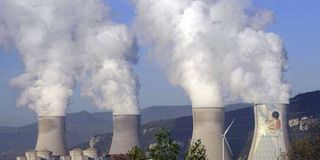US advises Kenya to proceed cautiously on nuclear power

Nuclear power plants. Kenya and other countries aiming to produce nuclear energy should reflect carefully on the ramifications of taking that step, a senior US diplomat has said . PHOTO | AFP
What you need to know:
- Washington has no concerns in principle regarding development of civilian nuclear technology in East Africa, Mr Countryman said.
- He added, however, that “nuclear energy represents a huge decision for any country to make.
- Speaking with the Nation from South Africa, Mr Countryman explained that his State Department bureau seeks to “keep the world’s most dangerous weapons away from the world’s most dangerous countries.”
Kenya and other countries aiming to produce nuclear energy should reflect carefully on the ramifications of taking that step, a senior US diplomat has said.
Thomas Countryman, assistant secretary of state for international security and non-proliferation, sounded a stronger note of caution specifically in regard to Sudan’s plan to build a nuclear power plant with Chinese assistance.
In an interview with the Nation, Mr Countryman also highlighted a US effort to persuade African nations to sever their military ties with North Korea.
Washington has no concerns in principle regarding development of civilian nuclear technology in East Africa, Mr Countryman said.
He added, however, that “nuclear energy represents a huge decision for any country to make.
In choosing this means of generating electricity, “you are committing yourself and future generations for hundreds and thousands of years to the nuclear fuel cycle and to the cost of maintaining safe disposal” of radioactive wastes, Mr Countryman noted.
“It’s not a decision to be taken lightly by any country,” he said, adding, “I am concerned about countries pursuing nuclear power because it looks like a good deal today.”
Kenya last month signed nuclear technology cooperation agreements with both South Korea and Russia. Kenya made a similar deal last year with China.
NUCLEAR POWER
These initiatives give concrete expression to the Kenyan government’s stated objective of producing nuclear power by the year 2030.
The country is taking preliminary steps toward the goal, a United Nations nuclear power monitoring group reported last year.
A team of experts from the International Atomic Energy Agency (IAEA) said at the conclusion of an eight-day mission in August 2015 that Kenya has made “significant progress” in establishing a decision-making framework related to nuclear-power infrastructure.
The experts also offered recommendations for further preparations on Kenya’s part. They suggested creation of a “robust” regulatory regimen along with training and skills development programmes to bolster human and institutional capacity.
Kenya has also been participating in US-sponsored projects in East Africa to promote cooperation on technical matters related to the feasibility of nuclear power programmes.
"Kenya should utilise nuclear power for it to become a middle-income country in the future," IAEA Deputy Director Mikhail Chudakov was quoted as saying in Nairobi two months ago.
Speaking with the Nation from South Africa, Mr Countryman explained that his State Department bureau seeks to “keep the world’s most dangerous weapons away from the world’s most dangerous countries.”
He specifically cited North Korea and Iran in that context.
The US diplomat made a recent stop in Angola, one of the African countries that has military ties to North Korea.
The Democratic Republic of Congo and Zimbabwe are also reported to maintain such links with North Korea in violation of UN sanctions.
TERMINATE RELATIONS
Mr Countryman welcomed Uganda’s recent announcement that it is terminating military relations with North Korea.
He said Washington looks forward to Kampala “fully implementing its promise” to cease those dealings.
No US welcome was extended in response to Sudan’s announcement last month that it has signed a framework agreement with China for construction of what would be the first nuclear power plant in Africa outside of South Africa.
Mr Countryman noted that the US “has a lot of issues with Sudan.”
He added: “I don’t think we want to add this as one more difficult issue in relations between the US and Sudan.”
Khartoum has “some work to do to convince the world they have done the necessary preparations to introduce nuclear power,” the non-proliferation specialist declared.




